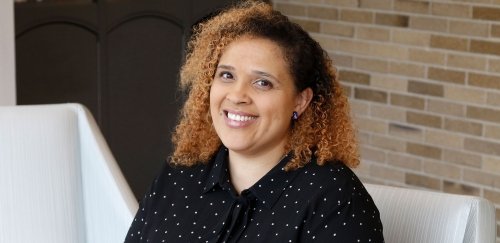MEET OUR GRADUATES: Foster Care Alumna Pays it Forward
- News & Events
- News
- MEET OUR GRADUATES: Foster Care Alumna Pays it Forward

Tiffanie Desrosiers, a social work major, was formerly in foster care and is now working towards becoming a foster youth therapist. “We’re not victims. We’re survivors,” she says.
This article is written as a first-person narrative based on an interview with Tiffanie Desrosiers.
I entered the foster care system when I was 15 years old. I was allowed to be placed with other family members – two aunts and my grandmother – until I completed high school. It kept me tied to family and to my culture, which is Cape Verdean.
After high school, I enrolled at Rhode Island College. It was 2001. At that time, if you were a full-time student in college or if you were working, you could stay in the foster care system until the age of 23. Today, you’re removed from foster care at age 18. Getting that support until I was 23 was extremely beneficial for me.
At RIC I majored in elementary education, with the intention of becoming a teacher. I was 18 and living on my own in my own apartment through an independent living program. I also had a job on campus. I loved being on campus, going to classes and the whole overall experience.
But when I aged out of foster care at 23, I was going through depression and was no longer really focused on school. I started to doubt myself and question if I wanted to be an educator. I felt I needed to take a break from school and figure out what I really wanted to do.
That semester break turned into a 15-year break, but I’m a firm believer that everything happens for a reason. I had to go through that process of figuring out what I wanted to do and gain experiences along the way. I wound up working in child welfare the entire time.
I worked at Foster Forward, teaching basic life skills and financial literacy to the youth in foster care; I was also a youth support specialist. Through the Jim Casey Youth Opportunities Initiative, I worked as a youth leader and was trained to advocate for myself and for youth in foster care. I worked at the UCAP School in Providence, as executive assistant to the founder and director – the late Rob DeBlois, M.Ed. ’91.
UCAP is a charter middle school that intervenes in the education of disadvantaged youth who have stayed back at least one year and who are at serious risk of dropping out of school. UCAP helps them catch up with their grade and go on to high school.
I also worked under contract with DCYF for three years, recruiting foster parents. However, eventually I felt I needed a degree. I wanted to apply for permanent positions at DCYF, but I couldn’t without a degree.
In 2021 I reached out to the executive director of Foster Forward, Lisa Guillette. I told her I was ready to go back to school – this time as a social work major. I had already completed 91 credits when I first enrolled at RIC. I had been so close to graduating. I asked her if she knew of any scholarships for someone like me.
She said Foster Forward has a donor who is willing to provide a scholarship for a foster alum who started college but was unable to finish. That donor will support them financially in getting their bachelor’s degree. At the time, I was 38 years old. I didn’t think I’d ever be picked, but I applied for the scholarship anyway. When I heard I had been picked, I cried. I am so, so grateful.
My donors are the Laplante family. The wife was a schoolteacher and the husband was a social worker. They’re a retired couple who just wanted to do something meaningful. I had lunch with them and many conversations with them, after which they decided not only to fund my bachelor’s degree, but to fund my master’s degree, as well.
I am now enrolled in RIC’s B.S.W.-to-M.S.W. degree program. It’s an accelerated program and very difficult; however, I can earn my M.S.W. degree within a year.
It has definitely been a positive experience coming back to school. Even though I returned to college with a lot of knowledge and experience, I learned more about social work as a field and the ethics of social work. I find that the faculty are really interested in helping students succeed. They give opportunities to students to work better, work harder. I think that’s a general trait among RIC faculty – they’re very supportive. They want you to do well.
After I earn my master’s degree, I’d like to continue to work with foster care youth. I’d like to become a licensed clinical social worker and provide therapy for young people.
Being in foster care taught me how to be resilient and to work off of my strengths. That’s what I want to pass on to youth in foster care when I become a clinician. We’re not victims. We’re survivors. We just have to figure out how to take the challenges that have been thrown at us and find some positivity in it. We have to learn how to turn it into a strength. Ultimately, it’s not what happened to us that matters in the end, it’s how we overcome it.
Learn more about Rhode Island College’s School of Social Work and Foster Forward.
